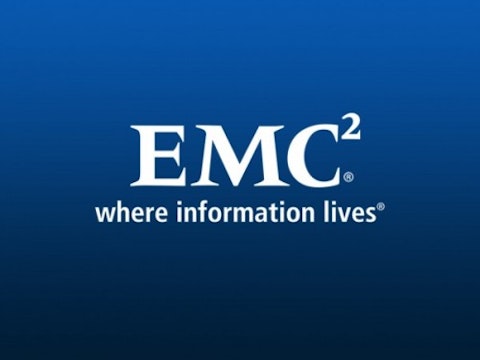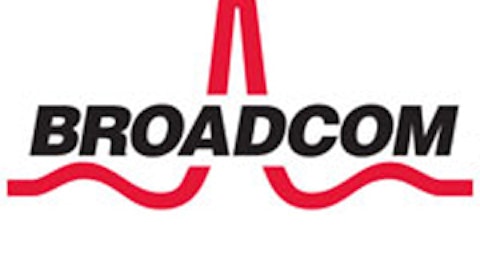It hasn’t been a great couple of months for investors of EMC Corporation (NYSE:EMC). Not only did the storage giant miss EPS and revenue estimates in its third quarter, but VMware, Inc. (NYSE:VMW), which is 80% owned by EMC, issued disappointing guidance for the current fiscal year. While EMC is still the clear-cut leader in the storage business, the company has not shown to be immune to weak IT spending. And just ahead of EMC’s Q4 report, as investors were in desperate need of some assurance that the company was winning the storage war… EMC delivered.

As many rivals can attest, the storage business has not been great this past year. This makes what EMC was able to accomplish all the more impressive. For the quarter, revenue arrived at $6 billion, or 8% growth year over year and roughly 14% sequentially. It’s worth noting that this was EMC’s first-ever quarter reaching the $6 billion mark. The company more than made up for its Q3 disappointment of $5.28 billion.
Likewise, net income was solid, advancing 5% year over year to $870 million, or $0.39 per share. Digging deeper, the company did very well with 6% growth in storage revenue, while product revenue advanced 5% year over year. High-end product revenue really stood out, rising 6% year over year and 14% sequentially. This indicates how highly regarded EMCs superior technology is, that customers were yet willing to shell out the big bucks amid a tough spending environment.
Profitability continues to improve. The company posted 1.5% growth in non-GAAP gross margin, which also arrived 2% better than Q3. Additionally, operating income climbed 13% year over year and almost 30% sequentially. These are absolutely breathtaking results relative to the disappointment that investors were preparing for. There have not been many reports that would be considered a “dominating performance,” but this one certainly fits the criteria (again, given the macro environment).
This also indicates that EMC remains a force within the sector and is gaining meaningful market share compared to rivals. Although NetApp Inc. (NASDAQ:NTAP) is a formidable opponent and is doing well in its own right, by comparison, the company just posted 4% revenue growth with an 18 basis-point decline in product revenue. This is while EMC’s mid-range product revenue grew 5% from last year and an impressive 22% above Q3. This difference is important as it supports why I’ve recently stated that NetApp may not remain an independent entity for very long. Although it’s proven that it can grow in this market, NetApp would be a dominant force if acquired by Oracle Corporation (NASDAQ:ORCL) .
For instance, aside from having been on an acquisition binge of late to strengthen its “one-stop-shop” objectives, Oracle already competes with EMC with Exadata, its enterprise flash storage solution. Although it’s gaining some traction, it has not been enough to scare EMC. But buying NetApp would get the job done, while also proving to EMC and International Business Machines Corp. (NYSE:IBM) that the database giant is ready for prime time. And based on IBM’s recent 5% decline in its storage division and Dell Inc. (NASDAQ:DELL)‘s own futility since ending its partnership with EMC, it’s been a two-team race with NetApp. EMC is several steps ahead. But this may change should Oracle enters the picture.
Road will be tough, but it can be done
The company’s chairman and CEO, Joe Tucci, who is one of the most underrated leaders in the market, spoke with confidence about his company’s direction after the record-breaking quarter: “EMC remains squarely at the center of the most disruptive and opportunity-rich shift in IT history, propelled by the benefits of cloud computing, big data and trusted IT. These high-priority IT spending areas are core to our strategic focus and represent market segments where EMC has established leadership positions and competitive advantage.”
It says a lot whenever a leader uses the word “disruptive” to describe his market and ways it can be attacked. To that end, unlike VMware, EMC didn’t offer gloom and doom. In fact, management actually felt compelled to defend its optimism that enterprise IT spending will rebound by stating, “You can’t starve it for too long.” In that regard, the company is projecting 8% revenue growth for fiscal 2013. While providing the outlook, Tucci reminded investors that revenue growth for the first half of the year will arrive slightly below 8%, while the second half will make up the difference.
Although management didn’t allude to this, much of the incremental difference has to do with EMCs product cycle. I do wonder, though, how much of VMware’s poor guidance is factored into EMC’s projections. For that matter, a case can be made that EMC is “low-balling” guidance. It’s either that or management is discounting its own strength, especially considering Hewlett-Packard Company (NYSE:HPQ)‘s recent statements about declining revenue in every business except software for fiscal 2013. It’s safe to say that HP’s storage business might be up for grabs. Combine that with the privatization of Dell along with IBM’s storage struggles, and EMC could be under-projecting revenue by 2%.
Buy these shares and store them
Given Tucci’s use of the term “opportunity-rich,” to describe the market, he’s salivating at the chance to jump on any new business. But let’s not assume NetApp is ignorant to these facts. The wild card here could be IBM, which has invested very little in its storage business. And this may be its only chance to finally catch up. For now, the storage market is EMC’s to win. Current trends and fundamentals support a fair value at $30, which is a 25% premium from current levels.
The article EMC’s Still Storing Growth, but for How Long? originally appeared on Fool.com and is written by Richard Saintvilus.
Fool contributor Richard Saintvilus has no position in any stocks mentioned. The Motley Fool recommends VMware. The Motley Fool owns shares of EMC, International Business (NYSE:IBM) Machines, Oracle, and VMware.
Copyright © 1995 – 2013 The Motley Fool, LLC. All rights reserved. The Motley Fool has a disclosure policy.




